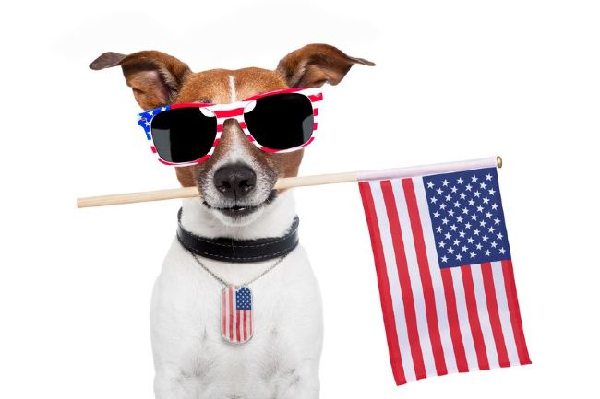
July 4 Hazards
Friday, June 30, 2017
According to the American Society for the Prevention of Cruelty to Animals’ Animal Poison Control Center, the four most common problems reported nearly every July 4th holiday are fireworks, food, lawn products and pool chemicals.
Fireworks are divided into personal use or professional use. Personal fireworks can be purchased and used where allowed by law. Professional fireworks are restricted.
Many chemicals can be found in any fireworks including aluminum, copper, lithium, nitrates, sulfur, titanium and zinc. Gastrointestinal upset, corrosive injury, dermal burns and possible foreign body obstruction are common concerns with fireworks exposure.
Summer festivities involve many foods that pets should not consume. Grapes or raisins, onions and garlic, macadamia nuts, chocolate, and avocados to name a few. Alcohol is also a big ‘no-no’ for pets.
Xylitol is a sweetener that can be found in many places including sugarless gum and candy and in some peanut butter. Make sure to check product labels.
Lawn products generally fall into three categories: herbicides, fertilizers and insecticides.
Casual exposure to yard products usually results in mild and self-limiting gastrointestinal upset. However, avoid exposure to agricultural products, larger exposures to insecticides (especially granular products) or older or foreign products.
Pool chemicals include chlorine tablets, muriatic acid and brominating tablets. Once these products have been diluted appropriately in the pool, there is usually not a serious concern. However, if the pet gets into the products directly, it’s very different.
If your pet consumes pool products directly, there is a concern for gastrointestinal signs and a potential for corrosive injury. Respiratory signs may be a problem if the exposure is in a confined area.
Always consult your veterinarian immediately if your dog or cat consumes something it should not eat.
In addition to things they can consume, the sound of fireworks can be very frightening to some animals. Be sure to secure your pets inside the house in a safe area if loud noises and crowds scare them.
Make sure your entire family—humans and animals—can enjoy a happy, healthy 4th of July holiday!
Veterinary Viewpoints is provided by the faculty of the OSU Veterinary Medical Hospital. Certified by the American Animal Hospital Association, the hospital is open to the public providing routine and specialized care for all species and 24-hour emergency care, 365 days a year.
